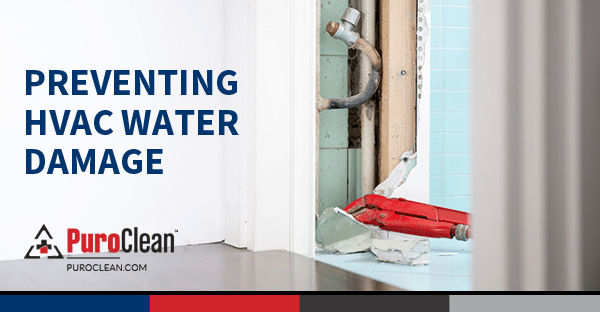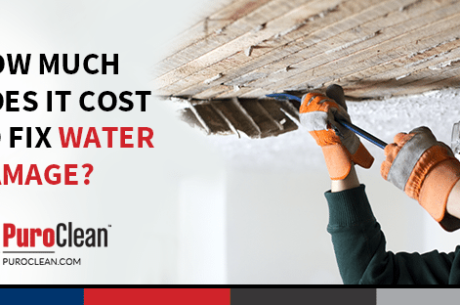Is Your HVAC Leaking Water?
A leaking HVAC or air conditioner can lead to severe water damage if not properly maintained. Some of the most common causes of HVAC water damage include a clogged drain, frozen evaporator coils, and a misaligned or damaged drain pan. If water overflows from the system, it can cause structural damage, mold growth, and even electrical hazards.
Routine maintenance of your AC or HVAC helps prevent water leakage and costly repairs. The good news is that many of these tasks are simple and can be done without a professional technician.
What’s Covered:
- Types of HVAC Water Damage
- What about Air Conditioner Leaks?
- How to Prevent Water Damage from Your HVAC
- Professional Water Damage Help
What Types of Damage Can a Leaking HVAC or Air Conditioner Cause?
A leaking HVAC or air conditioner can cause serious damage to your property if left unaddressed. Water leaks can lead to:
- Structural Damage – Prolonged moisture can weaken drywall, ceilings, and flooring, leading to warping, sagging, or even collapse.
- Mold and Mildew Growth – Excess moisture creates the perfect environment for mold, which can spread quickly and affect indoor air quality.
- Electrical Hazards – Water leaks near electrical components increase the risk of short circuits or fire hazards.
- HVAC Failure – Water in the wrong place can compromise internal components, leading to costly repairs or system failure.
Check out how to prevent mold in HVAC systems.
What About My Air Conditioner Leaking Water?
Your air conditioner may be part of a full HVAC system, which includes heating, ventilation, and cooling. However, some HVAC setups only provide heating and ventilation, meaning your air conditioner could be a separate, stand-alone unit.
Regardless of whether your air conditioner is integrated into an HVAC or operates independently, it can still cause significant damage if not appropriately maintained. Common issues like clogged drains, frozen coils, and misaligned drain systems can lead to leaks.
Most of the tips in the article apply to both stand-alone air conditioning units and HVAC systems, but some may not be relevant depending on the type of unit. Here’s a breakdown:
- Applicable to Both Stand-Alone AC Units & Full HVAC Systems:
- Changing the air filter
- Cleaning the condenser (for units with an outdoor condenser)
- Maintaining and unclogging the condensation drain line
- Installing a condensate pump (if needed)
- Maintaining the overflow drain pan
- May Not Apply to Stand Alone AC Units
- Some stand-alone units, such as windows or portable units, may not have secondary drain pans or condensate pumps.
- HVAC-specific components, like ductwork and furnaces, aren’t relevant to stand-alone ACs.
Is My Air Conditioner Leaking Water an Emergency?
A leaking AC unit isn’t always an emergency but should never be ignored. If water overflows, pools around the unit, or reaches electrical components, immediate action is needed to prevent further damage.
Shut off your air conditioning system and check for a clogged drain line, frozen coils, or a damaged drain pan. If the leak persists or causes water to leak into your home, contact a professional technician to prevent costly repairs and mold growth.
How to Prevent Water Damage from Your HVAC
Change the HVAC Filter Regularly
A clogged air filter limits airflow. This makes the system work harder and can cause frozen evaporator coils that eventually thaw and cause water to leak inside your home.
- Replace the air filter regularly. Follow the manufacturer’s guidelines for replacement frequency and the type of filter designed for your specific unit.
- A dirty air filter can circulate warm air instead of cool air, leading to moisture buildup and leaks.
- Consider hiring an HVAC technician if your air filter is inside the indoor unit or furnace and is difficult to access.
Clean the Condenser
The outdoor unit, or condenser, needs proper airflow to function efficiently.
- Remove any covers or objects blocking airflow.
- Remove dust, dirt, and debris from the entire unit at least once a year, preferably in early spring.
- Keep plants at least two feet away from the outdoor unit to prevent obstructions.
Maintain the Condensation Drain Line
When the AC unit runs, condensation forms as warm air meets the cold glass of the evaporator coil. This moisture should drain through the condensate drain, but a clogged drain line can lead to standing water and leaks.
- Check that water flows freely from the condensate drain line when running the AC system.
- If your unit has a drain hole at the base, clear it using a wire or paper clip.
- To prevent clogged drain lines, flush the condensate drain pipe once or twice a year with a mixture of hot water and white vinegar or a commercial AC drain cleaner.
- Avoid bleach if your system has PVC pipes, which can degrade the plastic.
- Ensure the primary drain pan and emergency drain pan are correctly aligned and free of debris.
How to Unclog the Drain Line
A clogged line is one of the most common causes of water leaking from an AC unit.
- Use a wet/dry vacuum to remove the blockage from the condensate line at the outlet (typically outside).
- Installing a float switch on the secondary drain pan or main drain line can shut off the unit if a clogged condensate line causes a backup.
Install a Condensation Pump (If Needed)
These pumps are typically needed when gravity drainage is not an option. If your HVAC unit is in a basement or another location below the drainage outlet, a condensate pump helps move water droplets to the appropriate disposal drain.
- Install a float switch to automatically shut down the AC unit if excess water forms. This lessens the risks of water damage.
- Inspect and replace this pump as it wears out.
- If your broken condensate pump is not functioning, it may cause water overflows and require a repair or replacement.
Maintain the Overflow Drain Pan
The primary drain pan collects condensation, while the secondary drain pan (or overflow pan) catches excess water dripping if the main drain is blocked.
- Over time, a drain pan may crack or rust, leading to leaks.
- If you notice water leaking near the drain pan, inspect it for damage.
- Replace damaged pans. As a quick fix, you can patch small cracks with epoxy, but this is only a temporary solution.
- Clean the drain pan regularly with a bleach-water solution to prevent mold, dirt, and dust buildup.
Have Your HVAC System Professionally Inspected Each Year
Some AC problems require an HVAC technician to prevent further damage. A professional can inspect and repair key components such as:
- Refrigerant levels – Low refrigerant can cause the air conditioner, leading to leaks when they thaw.
- Ductwork, furnace flames, and registers – Issues in these areas can impact airflow and moisture levels.
- AC compressor and thermostat – Malfunctions in these parts can contribute to inefficient cooling and condensation buildup in and around your air conditioner.
Consider Iot Devices for Early Leak Detection
Smart technology is revolutionizing HVAC maintenance, helping homeowners and businesses prevent costly water damage. Internet of Things (IoT) leak detection devices provide real-time monitoring, automated alerts, and proactive maintenance to stop leaks before they cause serious issues.
How IoT Leak Detection Works
IoT-enabled water leak sensors are placed near HVAC components prone to leaks, including:
- Condensate drain pans – Detects overflow before it spills.
- Refrigerant lines – Monitors excessive condensation.
- Water supply connections – Alerts to leaks in humidifiers or cooling towers.
These sensors connect to Wi-Fi or a smart home hub, sending instant alerts via smartphone apps, email, or SMS when moisture is detected. Advanced systems can even integrate with automated shutoff valves, stopping water flow before damage spreads.
For more information about staying ahead of water damage, read our guide on preventing water damage in winter.
If HVAC Leaks Caused Water Damage PuroClean Can Help!
Knowing how to prevent AC from leaking is sometimes not enough to prevent your unit from causing damage. When leaks occur, the moisture promotes mold growth that can contaminate the air in your home. For HVAC water damage and mold removal, contact PuroClean of Matawan today. Serving Matawan, NJ and surrounding areas. 📞 Call today (732) 351-2442




 PuroClean of Matawan
PuroClean of Matawan